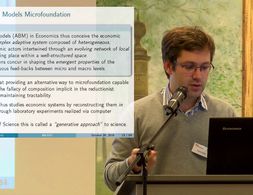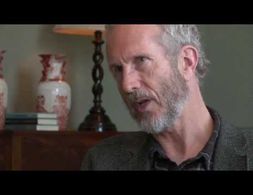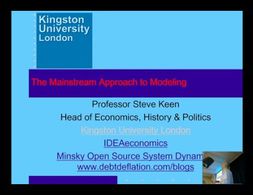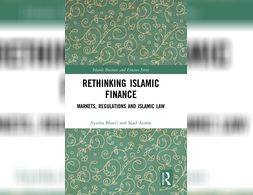✕
271 results
Antoine Godin gives a bright, illustrated, introduction to agent-based, stock-flow-consistent modeling, with a clear focus on the agent-based aspect.
One method of economic modelling that has become increasingly popular in academia, government and the private sector is Agent Based Models, or ABM. These simulate the actions and interactions of thousands or even millions of people to try to understand the economy – for this reason ABM was once described to me as being “like Sim City without the graphics”. One advantage of ABM is that it is flexible, since you can choose how many agents there are (an agent just means some kind of 'economic decision maker' like a firm, consumer, worker or government); how they behave (do they use complicated or simple rules to make decisions?); as well as the environment they act in, then just run the simulation and see what happens as they interact over time.
This article considers the strengths of agent-based modelling and the ways that it can be used to help central banks understand the economy. These models provide a complement to more traditional economic modelling which has been criticised in the wake of the Great Recession.
Complexity economics focuses on interactions and interdependencies between individuals and structures in economic systems. Those are systems of organised complexity. High importance is given to the analysis of networks.
This is an introductory lecture to Stock Flow Consistent SFC modelling Antoine Godin presents this family of macroeconomic models which is based on a rigorous accounting framework and guarantees a correct and comprehensive integration of all the flows and the stocks of an economy SFC models focus especially on interactions …
‘We cannot afford their peace & We cannot bear their wars’:
Value, Exploitation, Profitability Crises & ‘Rectification’
Ecological economics addresses one of the fundamental flaws in conventional economics--its failure to consider biophysical and social reality in its analyses and equations. Ecological Economics: Principles and Applications is an introductory-level textbook that offers a pedagogically complete examination of this dynamic new field.
The deceleration of world trade since 2011 has been widely discussed How much is due to a reversal of international production fragmentation And how much is due to decreasing demand for trade intensive goods The authors present a consistent framework that quantifies their relative importance A central concept in the …
This open access book presents an alternative to capitalism and state socialism through the modelling of a post-market and post-state utopia based on an upscaling of the commons, feminist political economy and democratic and council-based planning approaches.
Based on a critique on econometric and DSGE models (in particular in the context of the financial crisis), Doyne Farmer presents his current research programme that aims at building an agent-based model of the financial and economic crisis. It models heterogeneous agents and from there simulates the economy, firstly for the housing market. The interview gives a short insight in the research programme.
Post-Keynesians focus on the analysis of capitalist economies, perceived as highly productive, but unstable and conflictive systems. Economic activity is determined by effective demand, which is typically insufficient to generate full employment and full utilisation of capacity.
In a span of around 12 weeks, the course covers a wide range of topics including agent-based modeling, networks, dynamic, chaos, information, fractals, cooperation models and scaling in biology and society. The course acts as a perfect beginner level introduction spanning a wide range of topics in the field of complexity.
Have you ever wondered why it is so difficult to follow through on new year’s resolutions, such as to exercise more or to start saving more money towards retirement? The agent that most traditional economic models are based on would not struggle to keep up these resolutions. These agents are referred to as homo economicus.
In this course you'll learn about the tools used by scientists to understand complex systems. The topics you'll learn about include dynamics, chaos, fractals, information theory, self-organization, agent-based modeling, and networks.
The Philosophy of Economics Foundational Text provides a systematic and well-structured overview over the field of philosophy of economics.
Keen first compares neoclassical approaches to modelling with heterodox ones. Then he discusses in length the required assumptions and the inconsistencies of the aggregate demand and supply model, which is extrapolated from a micro perspective. At the end some dynamic models with feedback mechanisms are shown.
In this blog article Steve Keen elaborates on flawed climate change modelling and mainstream economics forecasts. In specific, he stresses the climate change forecasts of the DICE model (“Dynamic Integrated model of Climate and the Economy”) by Nobel Memorial Prize in Economic Sciences winner William Nordhaus.
In this radio interview, Philip Mirowski, author of the book "Never Let a Serious Crisis Go to Waste" presents several differences between neoclassical economics and neoliberalism. Apart from a historical outline, Mirowski primarily discusses different perceptions of markets and the role of the state. Mirowski further reflects on the role think tanks ("part of the "neoliberal thought collective") and the entrepreneurial self (the "neoliberal agent") in the spreading and fostering of the neoliberalism.
From the two premises that (1) economies are complex systems and (2) the accumulation of knowledge about reality is desirable, I derive the conclusion that pluralism with regard to economic research programs is a more viable position to hold than monism. To substantiate this claim an epistemological framework of how scholars study their objects of inquiry and relate their models to reality is discussed. Furthermore, it is argued that given the current institutions of our scientific system, economics self-organizes towards a state of scientific unity. Since such a state is epistemologically inferior to a state of plurality, critical intervention is desirable.
Rethinking Regulation of International Finance encapsulates the most important aspects of the development and operation of the international financial system. This book questions the fundamental basis of the existing international financial architecture (soft law) and explores the need for a compliance-based model based on legitimacy of regulations and accountability of the regulatory bodies in international financial stability.
This paper starts with an evaluation of three common arguments against pluralism in economics: (1) the claim that economics is already pluralist, (2) the argument that if there was the need for greater plurality, it would emerge on its own, and (3) the assertion that pluralism means ‘anything goes’ and is thus unscientific. Pluralist responses to all three arguments are summarized. The third argument is identified to relate to a greater challenge for pluralism: an epistemological trade-off between diversity and consensus that suggests moving from a discussion about ‘pros’ and ‘cons’ towards a discussion about the adequate degree of plurality. We instantiate the trade-off by showing how it originates from two main challenges: the need to derive adequate quality criteria for a pluralist economics, and the necessity to propose strategies that ensure the communication across different research programs. The paper concludes with some strategies to meet these challenges.
Islamic finance's phenomenal growth owes to the Shariah compliant nature of its financial instruments. Shariah forbids the charging of interest (Riba) and instead promulgates risk-sharing and trade-based modes of financing. The Islamic financial industry has been subject to both critique and admiration. Critics argue that Islamic instruments (bearing debt-based structures) differ from their conventional counterparts only in legal lexicon and not in economic impact.
Irene van Staveren, professor of pluralist development economics, presents her pluralist teaching method for the introductory level. Based on her textbook “Economics After the Crisis: An Introduction to Economics from a Pluralist and Global Perspective” she suggests to focus on real-world problems and pari passu apply economic theories such as Social economics, Institutional economics, Post-Keynesian economics as well as Neoclassical economics without wasting time to single out the latter. Besides pointing out advantages of such a pluralist method Irene illustrates her approach based on interesting topics such as growth or feminist economics.
This text provides an easy to understand introduction to complexity economics for non-specialist audiences such as bachelor's students.
As opposed to the conventional over-simplified assumption of self-interested individuals, strong evidence points towards the presence of heterogeneous other-regarding preferences in agents. Incorporating social preferences – specifically, trust and reciprocity - and recognizing the non-constancy of these preferences across individuals can help models better represent the reality.
Shadow banking became one of the main features of modern market based financial capitalism and financial globalisation. Daniel Gabor locates this development in a Super-Cycle framework and sketches out opportunities to launch a new cycle that is green and just through financial regulation and publicly organised sustainable finance.
Participants should be able to distinguish the strictly non-cooperative (methodological individualist) foundations of traditional neoclassical economics as being couched in self-interested individuals, as well as having basic knowledge of an alternative set of theories based on the primacy cooperation and social norms and extending the breadth of economic analysis beyond exchange.
This article outlines the fundamental challenges of democratically planned economies and categorises proposed models into six groups, each of which approaches planning and coordination at different levels of authority and between myriad economic units in a particular way, taking into account efficiency as well as democratic principles and environmental and social sustainability. Through a classification system based on decision-making authority and mediation mechanisms, the article provides a framework for understanding and comparing these models. By examining their different approaches, it offers insights into the complexities and potential paths of democratically planned economies in the 21st century.
The infographic focuses on women's hidden work that goes unrewarded due to the patriarchal setup and how it can be economically analysed. The article on which the infographic is based is written in an Indian context, although the phenomenon isn't confined to a single nation alone.
The last 15 years have seen extensive research into ecosystem service valuation (ESV), spurred by the Millenium Ecosystem Assessment in 2005 (Baveye, Baveye & Gowdy, 2016). Ecosystem services are defined as “the benefits people obtain from ecosystems” (Millenium Ecosystem Assessment, p.V). For example, ecosystems provide the service of sequestering carbon which helps regulate the climate. Valuation means giving ecosystems or their services a monetary price, for example researchers have estimated that the carbon sequestration services of the Mediterranean Sea is between 100 and 1500 million euros per year. The idea of ESV was a response to the overuse of natural resources and degradation of ecosystems, allegedly due to their undervaluation and exclusion from the monetary economy. ESV can be used (1) for policy decision-making, for example allocating funding to a reforestation project (2) for setting payments to people who increase ecosystem services, for example a farmer increasing the organic carbon content of their soil, and (3) for determining fees for people who degrade ecosystem services, for example a company that causes deforestation.
This blogpost discusses the bias the Economics discipline has towards Africa. It points out how important conferences on issues regarding Africa take place in Western countries at the expense of those based in Africa.
This course introduces students to the relevance of gender relations in economics as a discipline and in economic processes and outcomes. The course covers three main components of gender in economics and the economy: (1) the gendered nature of the construction and reproduction of economic theory and thought; (2) the relevance and role of gender in economic decision-making; and (3) differences in economic outcomes based on gender. We wil touch on the relevance of gender and gender relations in at least each of the following topics: economic theory; the history of economic thought; human capital accumulation; labor market discrimination; macroeconomic policy, including gender budgeting; household economics; basic econometrics; and economic crises.
We use cookies on our website. Click on Accept to help us to make Exploring Economics constantly better!





























